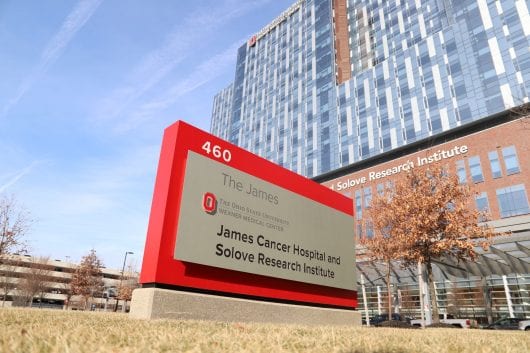
The Wexner Medical Center Board of Trustees discussed the James Cancer Center at their meeting Wednesday.
Credit: Casey Cascaldo | Photo Editor
Vaping research and progress at the James Cancer Hospital were among topics discussed at the Wexner Medical Center Board met Wednesday morning.
The Board received an overview about e-cigarette research currently being conducted at the colleges of Public Health and Medicine by Amy Fairchild, historian in the College of Public Health, Andy Thomas, associate professor of clinical internal medicine at the College of Medicine, and Peter Mohler, vice dean for research in the College of Medicine.
Mohler said the university is leading an effort to gather data and understand vaping’s impact on brain development and the pulmonary system to send to the Food and Drug Administration for its recommendations on how to deal with the minimally regulated market.
“This is a market that is changing the way — they change the pH in these e-cigarettes,” Mohler said. “They’re changing the flavor, and they’re going after, increasing the level of nicotine, to go after naive users, where these kids are taking it for the first time and seeing nicotine levels between three and 10 times higher than you’d see in a cigarette. So this is a challenge that we need to be able to provide data to deal with this.”
Over the course of six weeks, the university implemented a new standard phone line to the lung cancer screening center in the James for people who want to be able to quit vaping, Mohler said.
Bill Farrar, CEO of the James, discussed a National Cancer Institute grant proposal that was submitted by the Comprehensive Cancer Center leadership team. The grant would be renewed every five years and offer financial support to ensure administration of major programs, interdisciplinary basic and clinical cancer research, cancer education and training, cancer diagnosis and therapy and community outreach.
The James will have a site visit in May, and the final result of the grant application will be announced in the fall, he said.
The James is also initiating two statewide programs to help save the lives of cancer patients, the first being a cancer drug take-back program to reduce the financial burden of cancer patients, Farrar said. The program would allow patients who no longer require use of cancer drugs to donate to others who do.
“This month, the State of Ohio Board of Pharmacy changed its policy on drug donations, allowing patients to donate unneeded oral cancer therapy drugs to other patients that are fighting cancer,” he said.
Because of the policy change, Farrar said the James created a drug repository program this month to provide patients in financial need with donated medications.
“Ultimately, the most important goal of our cancer treatment is obviously to increase the survival rates of our patients, but often a lack of access and affordability can hinder our progress for that goal,” Farrar said.
The second policy is a state bill that would remove treatment access barriers for stage 4 cancer patients — patients with metastatic disease — through a partnership with the James and state Sens. Bob Hackett (R-London) and Hearcel Craig (D-Columbus), Farrar said. Such barriers include fail-first provisions, which require patients to try a generic alternative drug prior to receiving the financial coverage for the therapy initially prescribed.
“We are hopeful that we will be able to remove these barriers to treatment options for patients and families already encased in difficult diagnoses and tough physical, emotional and financial challenges,” Farrar said. “We’re really, very excited about both of these initiatives.”


